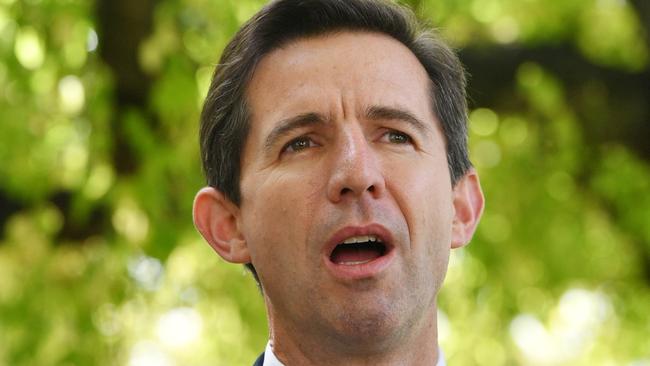Chaney SES review finds non-government schools funding flawed
The Turnbull government has admitted its funding model for non-government schools is flawed but will not address the core issues until 2020.

The Turnbull government has admitted its funding model for non-government schools is flawed but will not address the core issues until 2020.
The long-awaited review of the government’s socioeconomic status funding model has confirmed Catholic criticism of a system that was biased against low-fee-paying non-government schools.
But the government will not deal fully with the issue until well after the next election, opening up another front for Labor on the issue.
Education Minister Simon Birmingham has confirmed the government will adopt a new SES system that will use a direct measure of parental income to determine a school’s ability to contribute to the recurrent costs of the school.
Senator Birmingham said: “The report identifies that with recent data-collection improvements, a direct measure of parental income would now be a more reliable way to determine a school community’s capacity to contribute to the recurrent costs of the school.’
“The report makes it clear this direct measure of parental income can now be used without breaching privacy or requiring the collection of tax file numbers by a school.
“The report recommends the current system remain in place for 2019 and any changes to the SES model begin no earlier than 2020. This would provide schools certainty to plan and time for consultation and a considered government response later this year.’’
Senator Birmingham and cabinet colleague Christopher Pyne had savaged Catholic educators who pointed out the flaws in the SES system.
The current SES system estimates what people can afford to pay based on their neighbourhood. Each family is assigned to a neighbourhood of about 200 households, and judged to have the average characteristics of that area, but that means an elite boarding school can be deemed to be poorer than an inner-city Catholic school.
The flaws are not confined to Catholic schools, with low-fee paying independents also affected.
Senator Birmingham released the findings of the so-called Chaney report into the SES system.
The National School Resourcing Board has found that school fees are not an appropriate measure of capacity to contribute, which is a positive for the independent sector.
The board has called for further negotiations with the non-government sectors for the development of, and transition to, a new way of assessing schools’ and parental capacity to contribute.
The board recommends an annual residential address collection and data matching with income tax data to create a rolling average for a more stable measurement.
Senator Birmingham said: “The current SES methodology was introduced by the Howard government and it is right for it to be reviewed and improved.
“The report found current and recommended SES calculations were largely similar, underlining that using direct parental income data would be an evolution, not a revolution in the way non-government schools’ funding is distributed.
“The report makes it clear that more work needs to be done to further test and refine the recommended SES methodology. The next stages of this work will be done following consultation with educators, school systems, representative bodies, states and territories and policy makers regarding long-term arrangements and any transitional measures.
“Although the vast majority of projected school funding is unaffected by these recommendations we are mindful of the importance of certainty for schools and school systems and we will respond as quickly as possible following appropriate consultations.
But the Chaney review included a dissenting report by board member Greg Craven.
Professor Craven attacked the National Schools Resourcing Board decision not to include total private income of schools when assessing capacity to contribute.
This would have included assessing the size of school fees to determine how much funding a school community can pay.
National Catholic Education Commission (NCEC) acting executive director Ray Collins said the report endorsed the Catholic sector’s position that the current methodology for measuring a school’s SES was flawed.
“We have known well before the first Gonski review that the SES methodology is fundamentally flawed and negatively impacts a significant number of Catholic schools, as well as some independent schools,” Mr Collins said.
“We are very pleased that the NSRB has recognised the inherent inequities with the current methodology and look forward eventually to a new approach to ensure fair and equitable funding for non-government schools.”
However, Mr Collins said the NCEC does not believe that all appropriate measures of determining a school’s SES have been incorporated into this review.
“Of particular concern is the impact of a new methodology on long established, low-fee charging Catholic schools in metropolitan areas,” he said.
“We believe there is a lot of hard work ahead before a realistic funding model can be achieved.”



